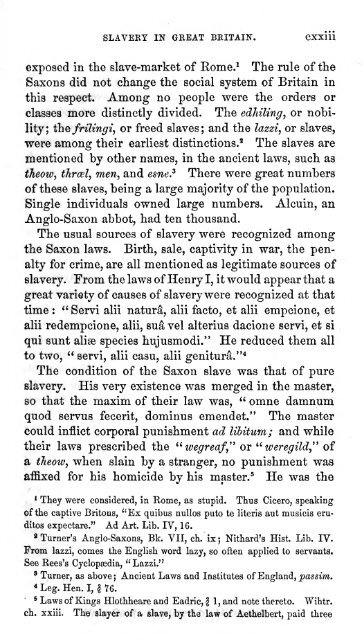Untitled - African American History
Untitled - African American History
Untitled - African American History
Create successful ePaper yourself
Turn your PDF publications into a flip-book with our unique Google optimized e-Paper software.
SLAVERY IN GREAT BRITAIN. CXX111<br />
exposed in the slave-market of Eome. 1 The rule of the<br />
Saxons did not change the social system of Britain in<br />
this respect. Among no people were the orders or<br />
classes more distinctly divided. The edhiUng, or nobi-<br />
lity; ihefrilingi, or freed slaves; and the lazzi, or slaves,<br />
were among their earliest distinctions. 3 The slaves are<br />
mentioned by other names, in the ancient laws, such as<br />
Meow, thrcel, men, and esne. 3 There were great numbers<br />
of these slaves, being a large majority of the population.<br />
Single individuals owned large numbers. Alcuin, an<br />
Anglo-Saxon abbot, had ten thousand.<br />
The usual sources of slavery were recognized among<br />
the Saxon laws. Birth, sale, captivity in war, the penalty<br />
for crime, are all mentioned as legitimate sources of<br />
slavery. From the laws of Henry I, it would appear that a<br />
great variety of causes of slavery were recognized at that<br />
"<br />
Servi alii natura", alii facto, et alii empcione, et<br />
time :<br />
alii redempcione, alii, suai vel alterius dacione servi, et si<br />
qui sunt aliae species hujusmodi." He reduced them all<br />
to two, " servi, alii casu, alii genituraV' 4<br />
The condition of the Saxon slave was that of pure<br />
slavery. His very existence was merged in the master,<br />
so that the maxim of their law "<br />
was, omne damnum<br />
quod servus fecerit, dominus emendet." The master<br />
could inflict corporal punishment ad libitum; and while<br />
their laws prescribed the "wegreaf" or " weregild" of<br />
a theow, when slain by a stranger, no punishment was<br />
affixed for his homicide by his master. 5 He was the<br />
1<br />
They were considered, in Rome, as stupid. Thus Cicero, speaking<br />
of the captive Britons, "Ex quibus nullos puto te literis aut musicis eru-<br />
dites expectare." Ad Art. Lib. IV, 16.<br />
2 Turner's Anglo-Saxons, Bk. VII, ch. ix ; Nithard's Hist. Lib. IV.<br />
From lazzi, comes the English word lazy, so often applied to servants.<br />
See Rees's Cyclopaedia, " Lazzi.' 7<br />
3<br />
Turner, as above ; Ancient Laws and Institutes of England, passim.<br />
4<br />
Leg. Hen. I, 76.<br />
5 Laws of Kings Hlothheare and Eadric, \ 1, and note thereto. Wihtr.<br />
ch. xxiii. The slayer of a slave, by the law of Aethelbert, paid three


